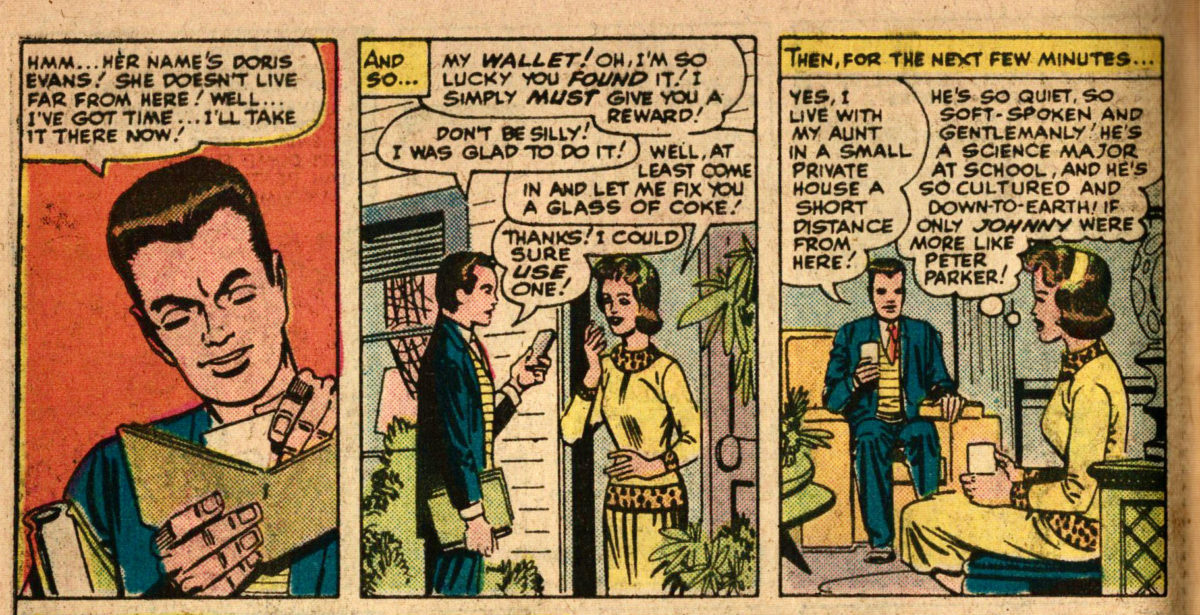Featuring: THUNDER Agents
Release: September 1965
Cover: November 1965
25 cents
| Previous | Next | |
|---|---|---|
| Daredevil #11 | Reading order | Amazing Spider-Man #30 |
We must find and train at least three special agents… the best!

We’re breaking my normal format for posts beyond the fact that this is plainly not a Marvel comic.
Normally, we read one story at a time, but I want to read the entire issue in one go. It consists of several shorter stories by different creative teams that add up to one larger story, all overseen by Wally Wood.
The issue has no credits, though sometimes artist signatures are visible. I have this in a collection, which credits the writers and artists involved when known. One or two names may be lost to history.
One of the disagreements between Wood and Lee was Lee taking the writer’s credit when Wood felt he was doing most of the writing. But this comic doesn’t credit anybody. In fact, most comics of the era don’t credit their creative teams. Lee was ahead of his time in trying to credit everybody. He just claimed a lot of credit for himself as well. Perhaps to Wood it was more about credit in the form of compensation than his name appearing in a box.
A couple notable differences from what we’ve been reading. First, the publisher is Tower Comics, a brand new publisher. Second, the price is 25 cents rather than 12 cents. Marvel prices its Annual comics at 25 cents, but its normal comics at 12 cents.
For 12 cents, Marvel comics give you 20-22 pages of content. The Annuals tend to be 70-72 pages for 25 cents, but with a lot of that dedicated to reprint material. This give you 60 pages of story for 25 cents.
Across the decades, comic prices had not changed much. Marvel Comics were 10 cents in 1939 and 10 cents in 1961 and 12 cents in 1965. They were very averse to raising the price, and had instead steadily decreased the page count over the years.
Thus, the page count of this comic is more reminiscent of 1940s comics than of its contemporary competitors. The idea that the individual stories all tie loosely together isn’t novel either, as 1940s Justice Society stories from DC had a similar structure, one Marvel imitated in the later 1940s with its All-Winners Squad.
We learn from the cover that THUNDER is an acronym. (Note for this blog, we’re not often including the “.”s in acronynms. I’m just too lazy to repeatedly type out S.H.I.E.L.D., finding it easier to type SHIELD.)
THUNDER: The Higher United Nations Defense Enforcement Reserves.
I can’t believe the “T” stands for “The”.
This title is a mix of superhero and spy adventure, with the acronym name likely inspired by “The Man from UNCLE”, and of course, the aforementioned SHIELD.
The concept was created by Len Brown and Wally Wood, who had previously co-created the science fiction trading card series, Mars Attacks.
Why are we reading this anyway? Because I wanted to see what Wally Wood got up to when he left Marvel. I think it will illuminate some discussions.
We’ll read through each story at a time, noting the title, creative team, and page count as we go. So don’t just stop when you get to the character lists. More stories to come below.
Continue reading “INTERLUDE: THUNDER Agents #1”


































